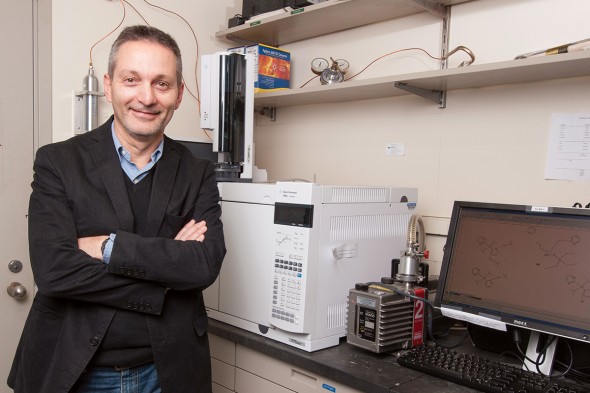Simplifying complexities

Vladimir Gevorgyan: “We work very hard — 10 to 12 hour days, six days a week, but it pays off.” Photo: Joshua Clark
The University Scholars Program, now in its 28th year, honors faculty members for superior research and teaching, along with great promise for future achievements. The award provides $10,000 a year for three years.
One word that stands out in conversation with Vladimir Gevorgyan is “new.”
“Our research goal is developing new concepts, new understanding of reactivities,” said Gevorgyan, professor of chemistry. “The major direction of our group is the development of new disconnections, new reactions.”
When Gevorgyan came to UIC in 1999, he was already a scholar of international reputation, said Astrida Orle Tantillo, dean of the College of Arts and Sciences, in nominating him as University Scholar.
Gevorgyan’s lab focuses on developing and understanding new chemical processes from which tools that are more powerful, more selective and more environmentally benign can be created, then used in a variety of new fields.
Gevorgyan’s approach to chemical synthesis includes an understanding of the issues of efficiency and environmental impact. He is interested in simplifying the synthesis of compounds by understanding exactly how to bring their components together. By ensuring that all the atoms that go into making a compound end up in the final product, the reaction is environmentally benign — no waste by-product.
Born in Russia, Gevorgyan completed his undergraduate degree at Kuban State University and his Ph.D. from the Latvian Institute of Organic Synthesis before doing post-doctoral research at Tohoku University in Japan. Before joining UIC he was a faculty member at Tohoku and the Italian Academy of Sciences in Italy.
There are about 20 people working in Gevorgyan’s lab, including graduate students, post-docs, undergrads and visiting research scientists. His students go on to post-doctoral positions at top universities like Yale, Harvard, Scripps, Caltech and MIT.
“We work very hard — 10 to 12 hour days, six days a week, but it pays off, we publish in very good journals and students go on to good positions in academia and industry,” said Gevorgyan.
If results aren’t important enough for a major publication, they aren’t published, he said. “We don’t just publish because we have results.”
Other University Scholars:
Michael Cho tinkers with biology
E. Douglas Lewandowski focuses on the heart
Constantine Megaridis changes interactions
